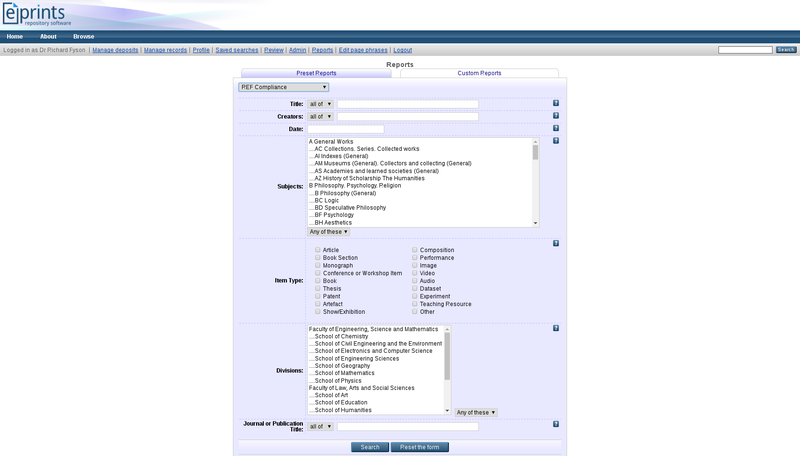Generic Reporting Framework
Contents
Introduction
The Generic Reporting Framework Bazaar plugin facilitates the creations of reports on records held within an EPrints repository that can be configured to return records based on certain criteria and to validate these records based on given test criteria.
For Users
The Generic Reporting Framework adds a new link to the key tools bar (alongside links such as 'Manage Deposits' and 'Admin') called 'Reports', that is only shown to administrator users.
This link displays the Reports splash page from which any available reports may be selected.
If custom reports are available, the splash page will display two tabs. One with 'Preset Reports' which display records that match predefined criteria. The other tab is for 'Custom Reports' which displays a search form with the report being comprised of records which match the given search criteria.
Once a report has been selected the page will reload to display the results of that report. This process may take a short while if there are lots of records to process. Items on this page are typically displayed next to a red or green bar to indicate whether or not the record matches this reports compliance check, along with some bullet points that should provide further information.
Reports may also be exported using the 'Export' button at the top of the page. Some reports support custom exports and where available a number of fields will be listed alongside checkboxes. Each checked field will be included in the exported report.
For Developers
GitHub: https://github.com/eprintsug/reports
The Generic Reporting Framework plugin is installed with a couple of example report plugins to illustrate how to create a new report.
Returning Report Bullet Points
By default, any problems that are identified by the report's 'validate_dataobj' function are displayed as bullet points for that item in the report. However, if you wish to display bullet points for an item which does not report any problems when validating, a new 'bullet_points' function may be defined, e.g.
sub bullet_points
{
my( $self, $eprint ) = @_;
my $repo = $self->{repository};
my @bullets;
foreach my $creator( @{ $eprint->value( "creators" ) } )
{
if( EPrints::Utils::is_set( $creator->{orcid} ) )
{
push @bullets, EPrints::XML::to_string( $repo->html_phrase( "creator_with_orcid", creator => $repo->xml->create_text_node(EPrints::Utils::make_name_string( $creator->{name} ) ), orcid => $repo->xml->create_text_node( $creator->{orcid} ) ) );
}
else
{
push @bullets, EPrints::XML::to_string( $repo->html_phrase( "creator_no_orcid", creator => $repo->xml->create_text_node(EPrints::Utils::make_name_string( $creator->{name} ) ) ) );
}
}
return @bullets;
}
The 'bullet_points' function should then be called from ajax_eprint when generating the report's JSON data, e.g.
sub ajax_eprint
{
my( $self ) = @_;
my $repo = $self->repository;
my $json = { data => [] };
$repo->dataset( "eprint" )
->list( [$repo->param( "eprint" )] )
->map(sub {
(undef, undef, my $eprint) = @_;
my $frag = $eprint->render_citation_link;
push @{$json->{data}}, {
datasetid => $eprint->dataset->base_id,
dataobjid => $eprint->id,
summary => EPrints::XML::to_string( $frag ),
problems => [ $self->validate_dataobj( $eprint ) ],
bullets => [ $self->bullet_points( $eprint ) ],
};
});
print $self->to_json( $json );
}
Returning Report Colours
Version 1.0 of the Generic Reporting Framework plugin, can only display two colours for records displayed in the report. When validating a record using the a report plugin's 'validate_dataobj' function, if an array of problems is returned the item is displayed with a red bar, and if none are returned the item is displayed with a green bar.
To return other colours, define a 'get_state' function which should return a string representing a hex encoded colour. E.g.
sub get_state
{
my( $self, $eprint ) = @_;
my $repo = $self->{repository};
if( $eprint->hasProblem() )
{
return "#E19141"; #orange
}
else
{
return undef;
}
}
The 'get_state' function should then be called from ajax_eprint when generating the report's JSON data, e.g.
sub ajax_eprint
{
my( $self ) = @_;
my $repo = $self->repository;
my $json = { data => [] };
$repo->dataset( "eprint" )
->list( [$repo->param( "eprint" )] )
->map(sub {
(undef, undef, my $eprint) = @_;
my $frag = $eprint->render_citation_link_staff;
push @{$json->{data}}, {
datasetid => $eprint->dataset->base_id,
dataobjid => $eprint->id,
summary => EPrints::XML::to_string( $frag ),
problems => [ $self->validate_dataobj( $eprint ) ],
state => $self->get_state( $eprint ),
};
});
print $self->to_json( $json );
}
Custom Reports
For a report to display in the 'Custom Reports' tab of the splash page, its custom property must be set. E.g.
#from within the local archive level
$c->{plugins}{"Screen::Report::REF_CC"}{params}{custom} = 1;
Custom Export Fields
To specify which fields should appear in the custom export box for a specific report plugin, include an 'exportfields' property in the plugin's configuration. This should comprise of a hash of 1 or more arrays, allowing fields to be grouped under a particular heading. E.g.
#from within the plugin's 'new' function
$self->{exportfields} = {
ref_core => [ qw(
eprintid
title
)],
ref_exceptions => [ qw(
hoa_compliant
hoa_ref_pan
hoa_ex_dep
hoa_ex_dep_txt
hoa_ex_acc
hoa_ex_acc_txt
hoa_ex_tec
hoa_ex_tec_txt
hoa_ex_oth
hoa_ex_oth_txt
)],
};
Change Log
1.0 (11 March 2015)
- Initial version of the Generic Reporting Framework plugin.
1.1 (14 June 2017)
- Added support for custom exports, where users can choose which fields to include in CSV exports from a predefined list in the report's plugin configuration.
- Added support for flexible reporting. Report plugins may be specified as permitting custom reports. Existing defined reports are displayed on the splash page in the 'Preset Reports' tab, a search form for custom reports is displayed in the 'Custom Reports' tab.
- Added support for allowing reports to return different colours, beyond the green=compliant, red=non-compliant states.
- Added support for bullet points to be added to any item in the report, not just non-compliant items.
1.1.1 (15 June 2017)
- Changed export interface to present field options in one div element, rather than as tabs.
- Removed custom report tab from the report splash page if none of the report plugins support custom exports.

